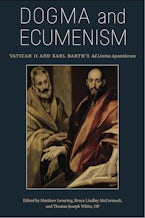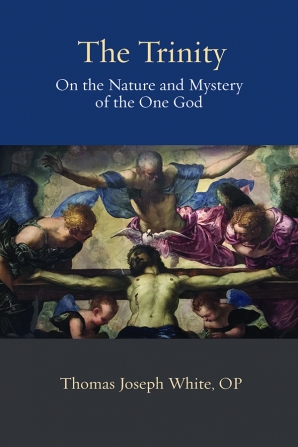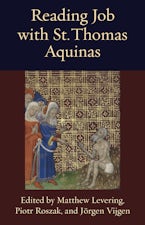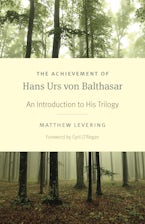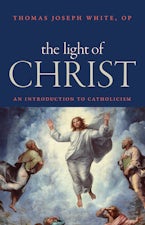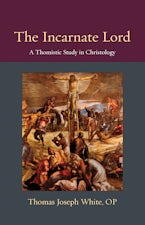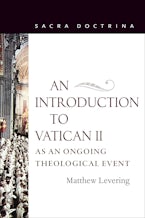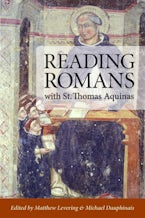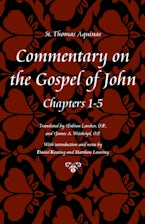Preparing your PDF for download...
There was a problem with your download, please contact the server administrator.
Dogma and Ecumenism
Vatican II and Karl Barth's Ad Limina Apostolorum
Edited by Matthew Levering, Bruce L. McCormack and Thomas Joseph White
Imprint: Catholic University of America Press
The conversation of this book is structured around five major documents from the Second Vatican Council, each of which Barth commented upon in his short but penetrating response to the Council, published as Ad Limina Apostolorum. In the two opening essays, Thomas Joseph White reflects upon the contribution that this book seeks to make to contemporary ecumenism rooted in awareness of the value of dogmatic theology; and Matthew Levering explores the way in which Barth’s Ad Limina Apostolorum flows from his preconciliar dialogues with Catholic representatives of the nouvelle théologie and remain relevant to the issues facing Catholic theology today. The next two essays turn to Dei Verbum, the Dogmatic Constitution on Divine Revelation; here Katherine Sonderegger (Protestant) reflects on scripture and Lewis Ayres (Catholic) reflects on tradition. The next two essays address the Dogmatic Constitution on the Church, Lumen Gentium, which touches upon central differences of Catholic and Protestant self-understanding. Christoph Schwöbel (Protestant) analyzes visible ecclesial identity as conceived in a Protestant context, while Thomas Joseph White (Catholic) engages Barth’s Reformed criticisms of the Catholic notion of the Church. The next two essays take up Nostra Aetate: Bruce Lindley McCormack (Protestant) asks whether it is true to say that Muslims worship the same God as Christians, and Bruce D. Marshall (Catholic) explores the implications of the Council’s reflections on the Jewish people. The next two essays take up the Pastoral Constitution on the Church in the Modern World, Gaudium et Spes: John Bowlin (Protestant) makes use of the thought of Aquinas to consider the promise and perils of the document, while Francesca Aran Murphy (Catholic) engages critically with George Lindbeck’s analysis of the document. The next two essays explore Unitatis Redintegratio: Hans Boersma (Protestant) asks whether the ecumenical intention of the document is impaired by its insistence that the unity of the Church is already present in the Catholic Church, and Reinhard Hütter (Catholic) systematically addresses Barth’s questions regarding the document. The noted ecumenist and Catholic theologian Richard Schenk brings the volume to a close by reflecting on "true and false ecumenism" in the post-conciliar period.
Matthew Levering is the James N. and Mary D. Perry Jr. Chair of Theology, Mundelein Seminary, and author and editor of numerous books, including The Achievement of Hans Urs von Balthasar: An Introduction to His Trilogy, An Introduction to Vatican II as an Ongoing Theological Event and Paul in the Summa Theologiae (all CUA Press). Bruce McCormack is Charles Hodge Professor of Systematic Theology, Princeton Theological Seminary. Thomas Joseph White, OP is Director, Thomistic Institute, Angelicum, Rome, and author of The Light of Christ: An Introduction to Catholicism and The Incarnate Lord: A Thomistic Study in Christology (both CUA Press).
"Makes a creative and substantive contribution to several fields: Barth studies, theological engagement with Vatican II, and ecumenical dialogue. Additionally, the overall effect of the volume certainly increases knowledge and analysis of Barth's Ad Limina Apostolorum, his understanding of Roman Catholicism and Vatican II, and the five documents under discussion themselves."
~Kenneth Oakes, University of Notre Dame
"With its focus on Karl Barth’s reception of Vatican II, this collection of essays provides an incisive series of reflections on five of the central conciliar issues. Written by a distinguished group of Protestant and Catholic scholars, the volume provides a wide-ranging and important contribution to continuing ecumenical conversation."
~David Fergusson, University of Edinburgh
"The insightful essays in this striking volume engage with the documents of Vatican II and with Karl Barth’s response to them. The combination of reflective voices from Catholic and Protestant traditions makes for a rewarding and stimulating read. If there is ecumenical ground to be gained in the seasons ahead, then profound scholarship that searches for theological truth in precisely this robust yet charitable way will be not only desirable but necessary."
~Paul T. Nimmo, University of Aberdeen
"In his meeting with Pope Paul VI in 1966 Karl Barth famously asked the question: What does Aggiornamento mean? Accommodation to what? Barth had the capacity to penetrate the dense thickets of theological analysis and get to the heart of an issue. In this collection of essays, the stellar cast of authors follow in Barth’s footsteps and explore the ecumenical potential of dogma in a field swept by the winds of historicism to a degree that Barth would have found deplorable, even scandalous. Theologians on both sides of the Reformation divide who accept the authority of scripture are today finding themselves drawn together by their mutual respect for divine teaching. This work is a showcase of that affinity and a storehouse of ecumenical treasure."
~Tracey Rowland, University of Notre Dame (Australia)
"Give and take between Catholic theologians and Karl Barth was a major element in the twentieth-century renewal of ecumenical dialogue. In this illuminating volume, leading Catholic and Protestant scholars take the conversation forward through impressive syntheses of historical attention to Barth’s work and the theology of Vatican II and contemporary concerns. Students of both Catholic and Protestant theology will see each other’s work in new light and new pathways for conversation."
~Martin Westerholm, University of Gothenburg

